Empty building fear for luxury Cardiff student flats
Cardiff could be left with a skyline of empty buildings after an "oversaturation" of luxury student flats, a leading architect has said.
Plans to create about 7,400 new student rooms have been approved in the city in the past five years.
But a number of schemes have since been let to professionals and tourists after a struggle to fill rooms.
Jonathan Adams, who designed the Wales Millennium Centre, said the buildings may have to be demolished.
Cardiff council said despite a number of applications for new student blocks, the number of beds remained fewer than the student population.
BBC analysis showed about 7,400 new rooms, the majority in purpose-built student accommodations (PBSAs), have gained permission or been granted on appeal since 2014.
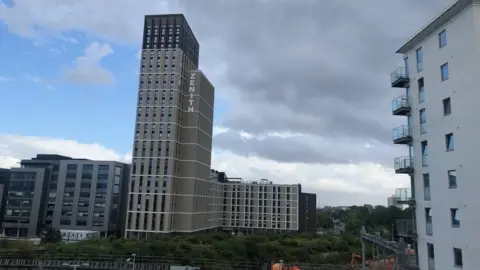
This includes Custom House - a 42-storey student block near Central Station which, if built, would be Wales' tallest building.
But five developments have changed use to let some rooms to non-students on a temporary basis after developers struggled to fill rooms due to construction delays.
Another PBSA in Cathays Park changed permanently to a residential hotel after developers said they could not fill a quarter of the rooms last year.
With more applying to change use, some schemes not yet built and plans for more student rooms on City Road, there are concerns the city will be left with student rooms that cannot be filled.

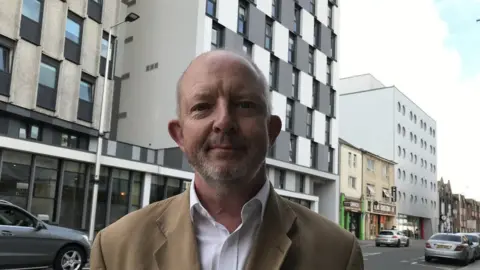
'They're made cheaply'
Mr Adams fears PBSAs will have a limited lifespan and does not believe they have been designed for alternative use.
PBSAs are classed as sui generis, meaning they are treated differently from other types of accommodation and standards for light, space and outside areas are often lower.
Mr Adams said this meant converting them into flats was not straightforward and developers could face hefty bills to adapt them.
"The problem is they will be dated, they are made cheaply, standards will move on," he said.
"It is difficult not to see a scenario in the future where we would not know what to do with them."
Last year Cardiff council introduced guidance advising PBSA developers to submit adaptability statements when applying for planning permission - to say how buildings could be changed into hotels or homes.
But this is not a statutory requirement and Mr Adams fears the buildings may stand empty in a few years.
"It could easily be the case that they could all end up being dismantled in 20 to 30 years' time, or be substantially altered," he added.

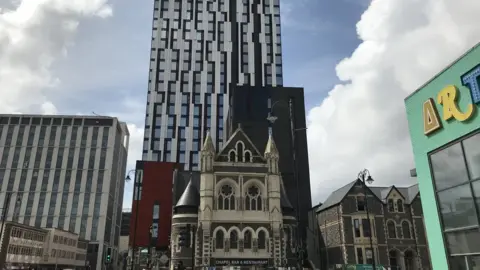
Cardiff Civic Society said the city's unique identity could be lost to high-rise buildings and student flats.
Dr Elaine Davey said: "We have wonderful buildings in Cardiff and this is spoiling the city."
In a bid to drive up standards, the Welsh Government set up the Design Commission for Wales to offer advice to councils.
Despite the commission objecting formally - for the first time - to student scheme Bradley Court, which involved the demolition of a Grade II-listed building, the council approved it.
The authority said it had detailed policies for the preservation and enhancement of heritage assets and there were a number of cases where buildings had been adapted for alternative use.

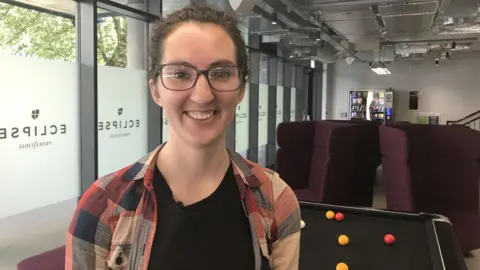
'I paid £650 a month'
Traditionally, Cardiff students mostly live in house shares - or Houses of Multiple Occupation (HMOs) - around Cathays and Roath.
But recently, PBSAs have been built, mainly aimed at international students.
Some hoped this would free up HMOs for families, but property expert David Feeney, of Cushman and Wakefield, said this was not really happening as rents were too high and the market was "oversaturated".
A market report by Saville's last year said the volume of PBSAs under construction or awaiting permission had reached record levels in Cardiff and supply was significantly below the anticipated growth in student numbers.
While many offer incentives, including reduced rents, cash back and free breakfasts, Mr Feeney said it was not yet enough to entice students from traditional house shares.
"If you are charging £150 a week for these flats, you are not going to get them out of the £80 a week HMOS, they cannot afford it," said Mr Feeney.
"There is going to be a lot of people going to be hurting and a lot of empty buildings."
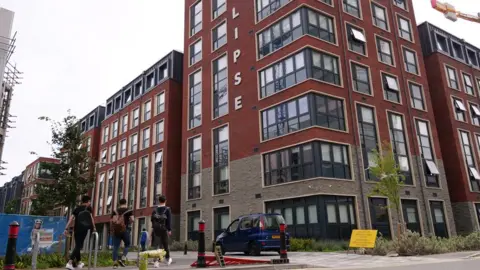
University of South Wales student Diana Finley, from Nevada, paid about £650 a month to live in the Eclipse development - which has a private dining room, cinema and gym and offered trips to north Wales.
Her friend Ellie Tipples lives in a traditional house share, paying about £350 a month.
Diana said she enjoyed her time living there, but did not think it was value for money as she did not make it on any of the trips due to her studies.
Collegiate, who manage Eclipse, said its accommodation was affordable and in high demand, and that the trips and extras it offered helped to support the physical and mental welfare of students.
Watkin Jones - the developer behind Custom House - said it did not recognise claims the demand was no longer there.
A spokeswoman said Cardiff remained a "vibrant and attractive student city and destination" with investor appetite remaining close to record levels.
CRM Students, which manages seven PBSAs in Cardiff, said it had achieved high levels of occupancy across all properties and expected them to be full or nearly full for the start of the academic year.
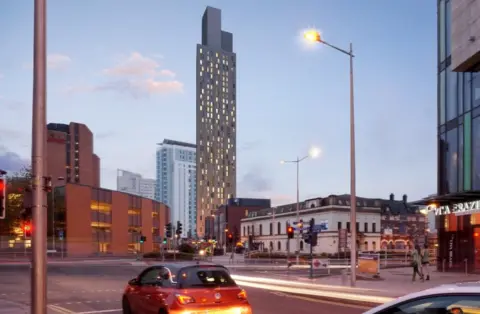 Rio/Watkin Jones Group
Rio/Watkin Jones Group 
Is there a loophole?
When a developer applies to build student housing there is no requirement to contribute towards affordable housing - automatically triggered in residential developments.
And - unlike hotels - owners of student flats do not pay business rates.
Some are concerned developers could be building PBSAs to get around standards and paying contributions, but developers dismissed this.
Mr Feeney said: "People are trying to play the system, they know they wouldn't get it through if it wasn't a student scheme."
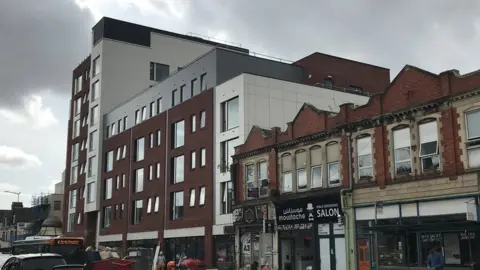
Residents believe the latest application, by DG1 Developments Ltd, to temporarily change flats on City Road to serviced apartments would set a "shocking precedent" for "unwanted" student flats.
The company said it had been unable to fill the rooms due to construction delays.
Last year it applied to turn the blocks to residential on a permanent basis, saying student rooms could become unviable because of lack of demand - the council refused and developers have appealed.
DG1 Developments Limited did not respond to a request for comment.

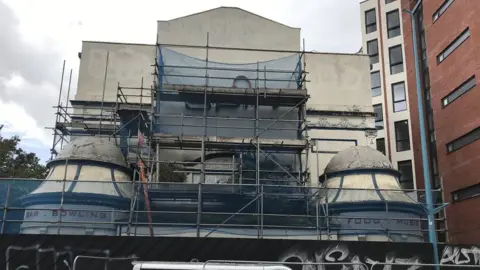
Dr Neil Harris, planning expert at Cardiff University, dismissed fears developers could be abusing a loophole to avoid contributions, saying it was "not a means of circumventing rules".
"The temporary change of use is a potential, and plausible solution to developers not being able to fill buildings if they can't get people in that year."
A council spokesman said claims developers could "short change" the planning process was "completely incorrect".
"[The applicant] would also be liable for new planning, architects and other professional fees, and in many cases could involve significant redesign to the inside and outside of the building.
"In other words it is a lengthier and more expensive way for a developer," he added.


What can the council do?
Councils are legally obliged to consider every application on an individual basis and can only refuse an application on planning grounds such as highway safety.
Cardiff council has put policies in place for HMOs, student flats and tall buildings to advise the committee and developers.
A spokesman said: "A planning authority cannot refuse an application because we don't believe there is a need for the development.
"Whilst Cardiff has seen a number of applications for new PBSA in recent years, the number of bed spaces remains significantly less than the student population of Cardiff."
